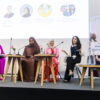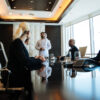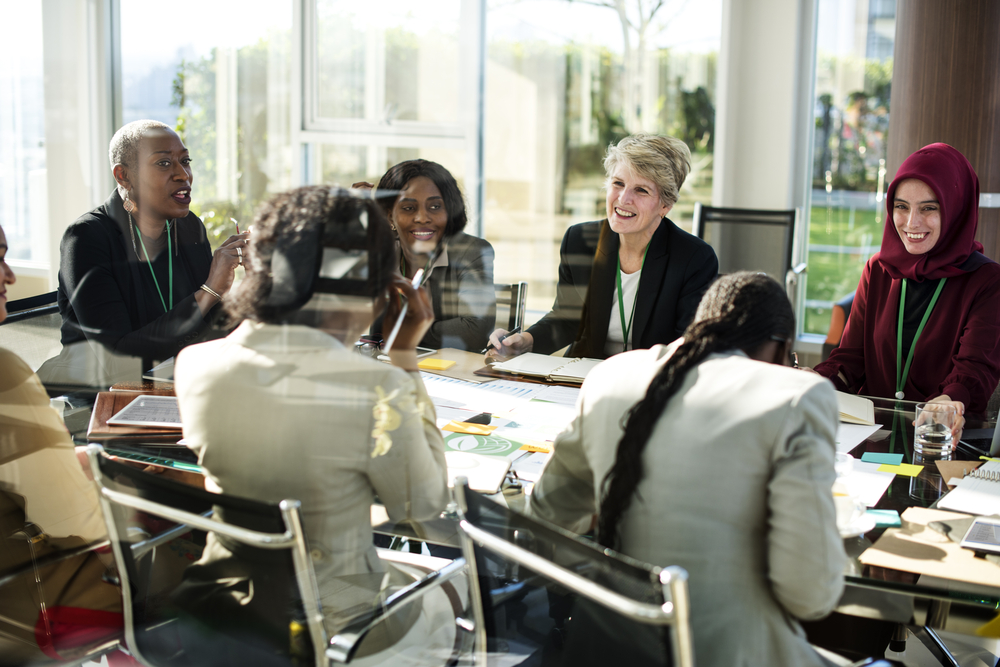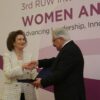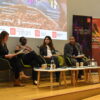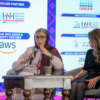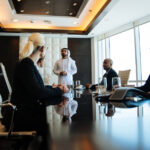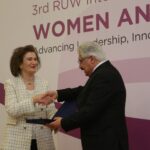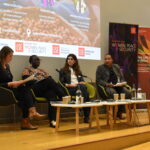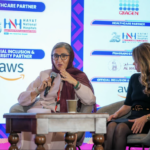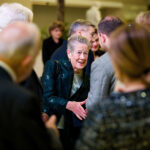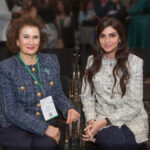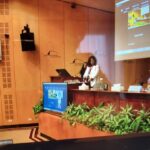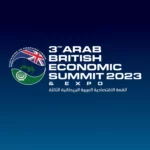In September, at the kind invitation of Baroness Nicholson, Chair of the AMAR Foundation, President of the Iraq-British Business Council (IBBC), and the Prime Minister’s Trade Envoy for Iraq, the Arab International Women’s Forum was proud to partner with AMAR and the IBBC on a webinar titled Unlocking the MENA’s full economic potential: Gender equality at home and at work.
The session was co-chaired by Haifa Al Kaylani, Founder & Chairman of AIWF, together with Baroness Nicholson, and welcomed distinguished Keynote Speakers HE Hala Bsaisu Lattouf, Former Minister of Social Development, Jordan, and Caroline Fattal, Board Member, Fattal Group, Lebanon to discuss the pivotal role of women in the MENA workforce, the additional burdens that the pandemic has placed on women as primary caregivers in the family and in communities which are impacting women’s economic engagement, as well as the need for legislative reform to bring gender parity to the forefront of the Arab sustainable economic agenda, supported by private sector workplace policy reform.
In her opening remarks, Mrs Al Kaylani paid tribute to Baroness Nicholson for all valuable collaboration between AIWF, AMAR and IBBC on delivering the webinar session. She said: “Baroness Nicholson has been a much valued and longstanding friend and supporter to AIWF for nearly 20 years and we all deeply admire the tireless dedication of Baroness Nicholson to advocating for peace for the Iraqi people for almost 30 years, as well as her dedication to helping Iraq rebuild by setting up the AMAR Foundation as a leading health and education charity benefiting Iraqi women, children and young people for a better future.”
Mrs Al Kaylani shared that globally, gender inequality has major economic implications for women, communities, societies and countries in a wide range of areas. Gender inequality is a persistent and universal challenge not limited to the MENA Region, which still has the lowest rate of female labour force participation in the world at just 24.6%. Even before the pandemic gender bias was still deeply rooted in many parts of the region and gender inequality existed at work because it existed in society and at home, and vice versa. Women do an average of 75% of the world’s total unpaid-care work, including childcare, caring for the elderly, cooking, and cleaning. In some parts of the world, including South Asia and the MENA Region, women’s share of unpaid-care work is as high as 80 – 90%. The ILO calculates that on average women around the world perform 4 hours and 25 minutes of unpaid care work every day compared with 1 hour and 23 minutes for men.
In her address, Mrs Al Kaylani elaborated on the challenges women face in the pandemic, including the burden on women of the unpaid care economy and care responsibilities in the home; women being disproportionately represented in industries that had been hardest hit by COVID-19 including retail and service-based industries, with women more vulnerable overall to job losses and economic instability because of pre-existing gender inequalities; and the negative impact on female entrepreneurship, especially in micro enterprises which account for a high share of female labour-force participation in many MENA countries.
She said: “The gender dimension of the COVID-19 crisis highlights the uneven progress made toward gender equality in recent decades. It is important to recognise that the region has come a long way and has made considerable progress in areas such as maternal mortality, women in professional and technical jobs, and representation at political / parliamentary level. There is greater acceptance and greater visibility for women’s leadership in every aspect of societal and economic development in the MENA countries. And there is clear and established support across MENA society for intervention from the highest levels on gender equality.”
Mrs Al Kaylani continued: “The key to unlocking gender inequality in the MENA region and beyond is strengthening women’s voices and leadership. To tackle gender equality, we need bold action and clear commitment from all parties – the private sector, governments, civil society, academia and the media all have vital roles to play in mainstreaming gender equality and ushering in normative acceptance of women’s leadership at all levels, in all sectors, and in all spheres, as well as inspiring a paradigm shift in attitudes of both men and women towards the division of family, care and household responsibilities. Men have a key role to play in achieving this vision. Men are not the problem, they are part of the solution as our partners in bringing about lasting gender equality.”
Baroness Nicholson thanked AIWF for co-operating with the AMAR Foundation on this important initiative. She acknowledged the role of AIWF over 20 years in empowering women and young people in the Arab world and shared the role of the AMAR Foundation in developing skills training for women in post-conflict areas and refugee situations. Baroness Nicholson called for more women to enter politics in order to mainstream gender inequality when she said: “We need good laws for women, and a justice system that is fair to women. To get more women into politics, entering the professions is key. Empowering women to get into the professions impacts on all women in society and internationally as well – we need women to enter the legal profession, to get involved in local justice systems, and move from there into policies where you will be implementing and setting the policies that address inequality.”
HE Hala Bsaisu Lattouf, Former Minister of Social Development, Jordan, talked about how women’s employment is so essential to the overall welfare and wellbeing of a country, and how important it is to have women’s voices heard at every level and embedded into all programmes to advance society. “Looking at the MENA, we cannot discuss women’s rights without looking at human rights and social justice. The MENA is a very wide area and different countries have different levels of women’s empowerment. We’ve been working on women’s empowerment for so long and there is still so much injustice, and we haven’t reached the goal we wanted. Maybe it is time we did things differently when it comes to human development, and maybe COVID will give us that chance. It is time to unbundle the way we’ve been doing things, and stop looking at women’s issues as women’s issues alone. We need to look at the broader challenges as a whole. We cannot solve one issue without thinking about our system of values.”
Caroline Fattal, Board Member of the Fattal Group in Lebanon, shared her perspectives on women’s empowerment as a social justice issue as well as on the positive impact that women’s leadership at board level and upper management makes to a business’ bottom line. She talked about the rise of gender-based violence, and how the difficulty of accessing paid work together with the lockdown restrictions has made it very difficult for women to balance work and life. “Women in the world represent 39% of the employees but they are experiencing 54% of job losses. Losing jobs at higher rate than men is leading to a serious gender regression. We are seeing a very important regression in gender and human economic participation. When women are employed, a major part of the income is geared towards children’s education and towards community harmony. It is very important that there is no regression in Lebanon and the whole region.” In Lebanon, she shared, she has launched an SME Fund to support with immediate relief for women-owned businesses.
AIWF was proud to partner with the AMAR Foundation and the IBBC on what was a highly engaging and well attended virtual initiative, and extends its deepest appreciation to Baroness Nicholson for her continued support of the AIWF mission.

